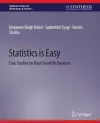
Statistics is Easy
3 authors - Paperback
£17.99
Manpreet Singh Katari is a Clinical Associate Professor and the Coordinator of Computational Studies in the Biology Department of New York University. In addition to teaching courses ranging from Statistics, Programming, Machine Learning, and Analysis of Next-Generation Sequencing Data, he also collaborates with researchers in the area of Plant Systems Biology. His main passion is in developing software that empowers researchers to analyze, integrate, and visualize large-scale genomic datasets. Although his work has been primarily in the model plant species Arabidopsis thaliana he has applied his knowledge to many crops, such as Rice, Corn, Banana, and Cassava, and also to human disease datasets such as cancer.Sudarshini Tyagi is currently a software engineer at Goldman Sachs where she uses machine learning particularly natural language processing and statistics to detect anomalies in financial regulations. She received her Master’s degree in Computer Science from Courant Institute of Mathematical Sciences at New York University, where she wrote a thesis on visually detecting breast cancers from mammograms. She also holds a Bachelor’s degree in Computer Science from Rashtreeya Vidyalaya College of Engineering, Bengaluru.Dennis Shasha is a Julius Silver Professor of Computer Science at the Courant Institute of New York University and an Associate Director of NYU Wireless. In addition to his long fascination with nonparametric statistics, he works on meta-algorithms for machine learning to achieve guaranteed correctness rates; with biologists on pattern discovery for network inference; with physicists and financial people on algorithms for time series; on database tuning; and tree and graph matching. Because he likes to type, he has written six books of puzzles about a mathematical detective named Dr. Ecco, a biography about great computer scientists, and a book about the future of computing. He has also written technical books about database tuning, biological pattern recognition, time series, DNA computing, resampling statistics, and causal inference in molecular networks. He has written the puzzle column for various publications including Scientific American, Dr. Dobb’s Journal, and currently the Communications of the ACM. He is a fellow of the ACM and an INRIA International Chair.